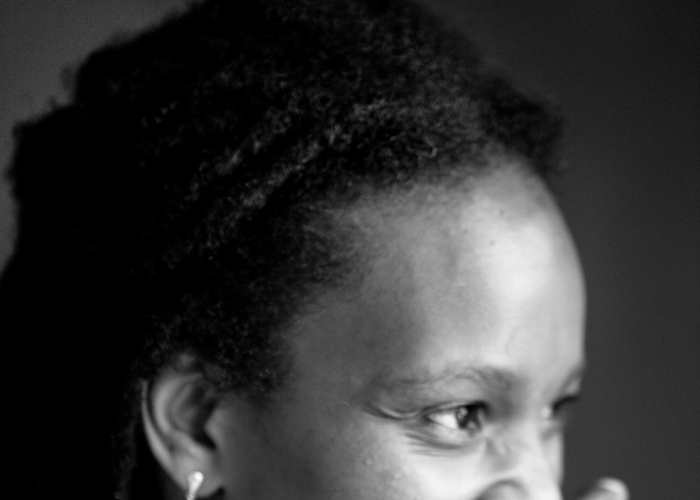A Hand Across Her Back

What are authors currently going through? For the Passa Porta Festival we asked seven writers from different countries to respond to this question with a new text. Their contributions have inspired us in compiling the festival programme.
Novelist Chika Unigwe, the author of The Phoenix, Black Messsiah, Better Never than Late a.o., decided to write a new story addressing themes such as migration and belonging, set against the backdrop of the current Covid pandemic in the States.
-
When Busonma left the house she wasn’t going to go to the cemetery. She hadn’t been since the funeral. Her intention had been to drive to Walmart to stock up on toilet paper. At the very beginning of the pandemic she hadn’t panicked. Not about running out of water. Not about running out of toilet paper. Not about Cheta. Now, she was at the Walmart or Kroger or Costco every other day buying things she already had in abundance, worried that she’d wake up one day and there would be rows and rows of empty shelves in stores. It was not like it hadn’t happened before. In the third week of the pandemic, Busonma had stood, immobilized, at the Paper & Plastic aisle of her local Kroger and bawled because it did not look like America. The shelves looked like an open gigantic mouth extracted of every single tooth. Busonma had gone to the Dollar Store next to the Kroger but they had a note on their door announcing that they were out of supplies.
Busonma had texted Cheta. “Babe, wahala dey ooo. No TP anywhere.” Eventually, Cheta had scored a pack from a CVS on Roswell road they’d never been to because it was too far. Customers were limited to a pack of six rolls per visit. Not even then had Busonma had the good sense to panic. Things might have turned out differently if she had. She nosed the car into an empty parking spot but she did not come out. Something heavy, like a hand pushed her down in her seat and she sat looking out the windscreen at a man walking past, huddled over a massive bouquet. She hadn’t even brought flowers for Cheta.
Everyone who knew them at university back in Nigeria knew they’d end up together. There weren’t many students who spent weekends playing house with their partners when there were parties to go to. Weekends they stayed in the apartment they shared — the BQ of an English Professor who sometimes invited them to hers for scrabble, and from whom Busonma learned the word frangible — watching TV or studying. Their friends complained, told them how boring it was to be so predictable, to live like this while they were still young. Once, when Dike, Cheta’s friend couldn’t get him to drive down to Enugu from Nsukka with him for a concert because Cheta had promised to keep Busonma company while she had her hair braided, Dike had said “Two of you will marry and have a long time to be old together. What’s all this nonsense now?”
Busonma had not thought of Dike in a long time. She wondered now where he was, if he thought she and Cheta were spending their time getting old together or if he had heard already. Busonma was not on social media so she had not announced it as a status update on Facebook or however it was done, and she had no way of knowing who knew what.
After Cheta died, Busonma’s mother had asked her if she wanted to come back home for a while. Her mother could not get an American visa or she would have come herself. No one should grieve alone, her mother said on the phone. No one should cry alone was what she had really said in Igbo. “Come home so that we will cry with you.” Busonma imagined being at her parents’, surrounded by people crying with her, some who had not even known Cheta. She hung up on her mother. What did any of them know about how a heart could be ripped out? What did they know about holding your breath, feeling like any slight movement, any impact would splinter you? Did they know what frangible meant? What did they know about guilt like shards of glass cutting you up from the inside, hollowing you out? And what did her mother mean by “come home”? She was already in her own home. A house she and Cheta had chosen. When they moved in, they had walked through every room, marveling at the fortune that had made them owners of this beauty with gleaming wooden floors in every room except in the basement with its mini theatre and sound proof walls. That was their favorite room and they’d often sit there eating popcorn pretending they were on a date at a cinema. Since Cheta’s death, the house seemed to have constricted, grabbing her in a chokehold so that she could not breathe.
Busonma had not lived with her parents in almost twenty five years, and not in Nigeria for almost as long. The last time she was in Nigeria was two years ago when Cheta’s father died. Even then they had only stayed just long enough for the weeklong funeral. Cheta was the youngest of three sons. His older brothers had good jobs in Lagos, so all Cheta and Busonma had needed to do was turn up. Busonma who had always found Cheta’s father somewhat intimidating and distant hadn’t been devastated by his death and had intended to treat the trip as a vacation. It was a disaster. They spent one jet-lagged night in Lagos unable to sleep because there was a power outage and the generator Cheta’s brother turned on to power the air conditioner that cooled the house snored loudly through the night. They had flown into Enugu the next morning, had an early lunch with Busonma’s parents and driven down to Cheta’s village where they spent a week welcoming mourners. Even though caterers had been hired to cook for the guests who poured in like tsetse flies, buzzing everywhere one looked, Busonma’s mother-in-law insisted that the food she and the family ate could not be made by strangers. “Tufia! You modern women do not know anything,” she said when Busonma asked why. Later, she told Busonma of how her own mother had been poisoned at her uncle’s funeral by someone who slipped strong medicine in her food. One minute she was there, the next fiam she was gone. Dead.
Cheta had been there one minute laughing with her at some nonsense on TV, her head under his arm, his hand down her back, the way they often sat. The next minute he hacked out a cough and joked, “Corona.” He did not cough again but the next day, a Tuesday, he ran a mild fever and complained of a stubborn headache. He took some ibuprofen and stayed in bed until he felt better and then he and Busonma went for a walk around their upscale neighborhood where all the houses had porches and long driveways snaking up to them, and Cheta and Busonma were the only black people who lived there. They had never been invited to anyone’s house although the neighbors waved when they bumped into each other on their evening strolls, and once a couple stopped them to tell them that their grandchild who was in high school was dating a rather lovely African-American girl. Fantastic girl. Beautiful girl. And where was their accent from? Nigeria? Oh! Awesome. They had a family friend whose son worked for a long time for the UN in Somalia. "Y’all have a lovely day.” She doubted that any of her neighbors had noticed that Cheta was dead.
If he had COVID then she should too but she was fine. When Cheta woke her up early on Sunday and panted that he could not breathe, she had driven him to the hospital. She had listened as if underwater as a doctor told her his organs were failing. Said something about sepsis. Said something about infection in the lungs. Said something about acute respiratory distress syndrome. Said something else she could not decipher. And something else. And something else. The doctor’s voice came to her distorted, a woosh woosh woosh hitting her face. By Sunday night, Busonma had become widowed, a Christmas bauble thrown from a height. Shattered. She had been too numb, too bewildered to cry. Too eaten up with guilt. Cheta’s death set her adrift. She could not tell how she got home. Or how in the days that followed she slept or woke up or made the phone calls that she had to.
Cheta’s mother had expected Busonma to bring his body back to be buried beside his father, in the family compound. The way things were done. The news was relayed to Busonma by Cheta’s eldest brother, Broda Azi because he was the oldest and also the only one who was strong enough to talk without breaking down. “It’s the tradition, you know,” he told Busonma as if she too were not Igbo. She understood tradition. She would accompany his corpse back to his village, submit herself to having her hair shaved off, to wearing only black or white for six months. She’d be made to receive guests for a week. Most of them would be people she didn’t even know, she had lived so long abroad that everyone she knew in Nigeria was somewhere else too. “Fuck it,” she told Broda Azi, startling him with her cussing. “I bury him in Nigeria and I come back here empty handed?” She did not say that she could not face them yet, not with the guilt haloing her head.
“I understand,” Broda Azi said. “You do what you have to do, I’ll talk to Mama.” The kindness in his voice made her cry, tears glazing her face in a way they hadn’t in the two days since Cheta’s death. In the past, when husbands died of unnatural causes, their widows were made to drink the water in which their corpses were washed to prove that they had no hand in the death. There was nothing natural, Busonma thought, about her husband’s death.
The next day, she drove to the funeral home close to the Walmart and spoke to a sweaty man who gave her papers upon papers to fill in. Where had Cheta worked? What were his parents’ names? He offered her water to drink. Or did she prefer soda? “No thanks.” Did she want to buy a single plot or a double plot? It was easier that way, when she died she could lie next to him. When she said double, he smiled at her as if she had given the only correct answer and said, “Great, gets that out of the way now.” She had wanted to stand up and walk out. There was nothing great about any of it. Not buying a plot to bury the man you had expected to grow old with. Not being the reason he died. Later, when the death toll increased and she saw pictures of mass graves in New York, she had thought how lucky it was that they had not ended up in New York. Maybe that was what it meant to have a silver lining behind every dark cloud.
Busonma and Cheta had relocated to the United States the year they got married. They had chosen Atlanta over New York for the weather and its relative cheapness. For the price of a mansion in Atlanta, all you get in New York is a small apartment. Atlanta too had African stores and restaurants, and so many Nigerians it was almost like being back home. “That’s why I moved here from Boston.” “If you wanted to be back in Nigeria, why don’t you go back? ” Busonma asked this her husband’s cousin who had been living in the United States since the late 80’s, since Cheta was a child. He had made enough money he could retire to Nigeria and live comfortably. The man had laughed and wagged a finger at Busonma saying “You eh, You eh,” as if Busonma were a child deliberately being facetious. She was genuinely curious. She did not get it all. Nigerians who moved abroad only to seek simulacrums of the very same place they had left behind, but never returning even when they could. She and Cheta knew moving here, that they would make a home here. There had been moments in the past four years, especially after the 2016 elections, when their commitment had wavered. But only slightly. Busonma worked as an accountant for an NGO, Cheta worked as a risks analyst for a big bank. Their combined income brought their feet solidly in the door of America’s middle class. We don’t need to return anywhere, Busonma said to Cheta after his cousin left.
The plan had been that they would have at least one child. In the first year of their marriage, Cheta’s Moses basket stayed in a corner of their bedroom ready to welcome the child they’d agreed to name Kaito, a name that was so neutral it worked for either a boy or a girl. Cheta had wondered if they should not adopt in their third year when they began actively trying for a child and were told that due to some fluke of nature, Busonma could not carry a child. In the end, they had agreed that they had each other, what need was there of a baby? When they moved into their new home two years ago, they hadn’t unpacked the basket. It was in the garage now, covered by Styrofoam in a moving box to keep it from crushing.
Busonma gasped when a couple pushing a pram walked past her. The top of the pram looked exactly like a replica of Cheta’s basket. Busonma did not believe in signs or things she could not explain, but at that moment, she felt certain that this was a sign. She pulled open the car door and stumbled out in a daze into the November cold of Atlanta. For a minute, she panicked that she could not remember exactly which part of the cemetery Cheta’s grave was in. She closed her eyes and let her feet lead her. On the day of the funeral, the Igbo organization she and Cheta belonged to, Nwannedinamba, had sent a delegation even though she had told them not to come. Fifteen men and women in identical outfits who called her “sister.” They walked behind her as she followed the hearse carrying Cheta’s coffin to the graveside. She had been irritated at first. She didn’t know any of these people well enough. Not even the couple who at every meeting invited Busonma and Cheta to visit them, an invitation that was never taken up. Before the pandemic, the group had met up once a month in some hall in Mableton. Joining Nwannedinamba had been Cheta’s idea. The more sentimental of the two, Cheta said living so far away from Nigeria and surrounded by whiteness at work and in their neighborhood, he needed people from home with whom he could meet with on a regular basis.
Busonma who did not care for groups had gone to meetings purely to please her husband, sitting through discussions of scholarship funds for deserving but financially strapped Igbo youth in Atlanta and not paying much attention when they began heated discussions of politics in Nigeria. When she called the president of Nwannedinamba to say that Cheta was dead, she made sure to tell him that she was planning an intimate, family only funeral by which she had meant just herself and Cheta’s cousin. “Family only is good,” the president said. Now, seeing them filled her up like food. It was as if she hadn’t realized she was hungry until a dish was placed in front of her. They hadn’t been members for up to a year but the president slipped an envelope into her hand. “A small something. We do this every time one of us loses immediate family. It’s not often, thank God!” Busonma had been touched. To be the “one of us” of a group she had unwillingly joined. It occurred to her that when the president said, “Family only is good,” he had counted Nwannedinamba as part of it.
Busonma had spent the $500 on hand sanitizers and toilet paper, stacking them in her garage. These days, her garage looked like something from Extreme Couponing, it would have amused Cheta to see it but the sight of all of her purchases — the rolls of toilet paper, the hundreds of hand sanitizers and gloves and boxes upon boxes of anti-bacterial sprays — all of them were the ballasts tethering Busonma to life. She had begun her shopping frenzy about a week after Cheta died. She needed to be out of the house, to hold on to something. She drove from store to store buying up as much of the products as she could, the solidity of them in her cart filled her up with air so that she lost the feeling she had of floating.
When she stopped in front of Cheta’s grave, Busonma felt a shifting inside her, as if her organs were re-arranging themselves. Across the face of the headstone was a smudge. She reached into her purse and brought out a sanitizing wipe and began to wipe it off, tracing the words etched on it with one finger.
“I am sorry,” she said. She wiped some more. “So, so sorry.” When the stores emptied out that third week of the pandemic, Busonma told Cheta she could no longer bear to go shopping. It made her nervous and sad to see the empty shelves. And so Cheta had taken over running all the chores. If he hadn’t, he would still be alive because how else could he have got the virus? Snot ran down her nose and into her mouth but she did not wipe it away. “I am so sorry,” she cried. Busonma did not believe in ghosts but she would say later that while she was crying at the foot of her husband’s grave, she felt a presence, a tender warmth on her shoulder. A hand across her back. She hadn’t even entered her car when she called the couple from Nwannedinamba. Could she come and visit them that weekend? When she got home, she went into the bedroom and brought out all of Cheta’s clothes. She made a mountain in the middle of the bed and sank into it, Cheta’s smell entering her ears, her nose, her eyes, every crevice of hers, stuffing up every hollowed out part of her. Around her head, she could feel the halo spiraling into the air, a white puff of smoke.
Chika Unigwe, 2021
Chika Unigwe (b. 1974), an English-language Igbo writer of Nigerian descent, lived in Belgium for many years and now lives in Georgia, USA. She obtained her PhD at Leiden University, and made her debut in 2005 with the novel The Phoenix. She has received several literary awards, including the NLNG Prize for Literature for Fata Morgana.
Find Chika Unigwe at the Passa Porta Festival 2021



